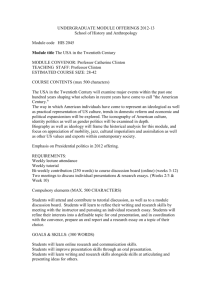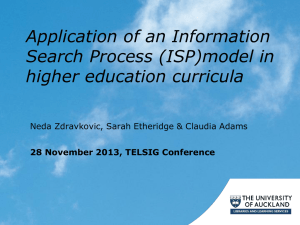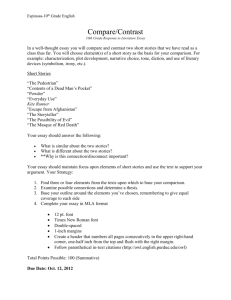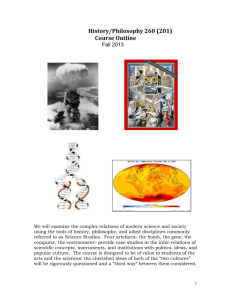H-596 syllabus
advertisement
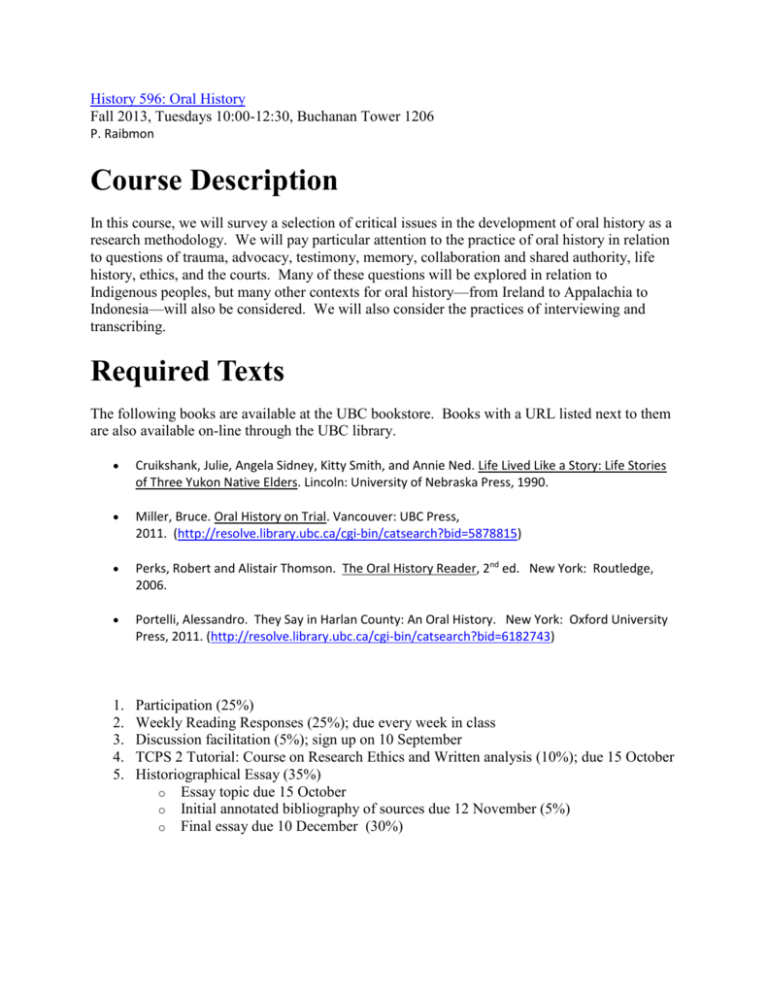
History 596: Oral History Fall 2013, Tuesdays 10:00-12:30, Buchanan Tower 1206 P. Raibmon Course Description In this course, we will survey a selection of critical issues in the development of oral history as a research methodology. We will pay particular attention to the practice of oral history in relation to questions of trauma, advocacy, testimony, memory, collaboration and shared authority, life history, ethics, and the courts. Many of these questions will be explored in relation to Indigenous peoples, but many other contexts for oral history—from Ireland to Appalachia to Indonesia—will also be considered. We will also consider the practices of interviewing and transcribing. Required Texts The following books are available at the UBC bookstore. Books with a URL listed next to them are also available on-line through the UBC library. Cruikshank, Julie, Angela Sidney, Kitty Smith, and Annie Ned. Life Lived Like a Story: Life Stories of Three Yukon Native Elders. Lincoln: University of Nebraska Press, 1990. Miller, Bruce. Oral History on Trial. Vancouver: UBC Press, 2011. (http://resolve.library.ubc.ca/cgi-bin/catsearch?bid=5878815) Perks, Robert and Alistair Thomson. The Oral History Reader, 2nd ed. New York: Routledge, 2006. Portelli, Alessandro. They Say in Harlan County: An Oral History. New York: Oxford University Press, 2011. (http://resolve.library.ubc.ca/cgi-bin/catsearch?bid=6182743) 1. 2. 3. 4. 5. Participation (25%) Weekly Reading Responses (25%); due every week in class Discussion facilitation (5%); sign up on 10 September TCPS 2 Tutorial: Course on Research Ethics and Written analysis (10%); due 15 October Historiographical Essay (35%) o Essay topic due 15 October o Initial annotated bibliography of sources due 12 November (5%) o Final essay due 10 December (30%) Participation (25%) Everyone’s active, thoughtful, and respectful participation is an essential for the success of our joint learning endeavour this semester. Successful participation includes: attending class: explained absences (due to religious holiday, documented illness or funeral) will not affect your participation grade, but more than one unexplained absence will result in a “zero” for your participation grade for each additional class that you miss; your full attention: please please turn off your cel phone, and refrain from texting, using facebook, twitter, or the internet. Use laptops only for taking notes related to class; carefully reading and reflecting upon the assigned readings before class; framing your comments and questions in a skilful manner that opens up further discussion and invites commentary; listening attentively and responding to the comments of other students; choosing the appropriate moment to make your intervention in class discussion; working collaboratively to ensure a positive space for discussion and learning in which everyone’s views are respected posting 2-3 discussion questions by 7pm every Monday on the front page of the course blog to assist the discussion facilitator with his or her task. Useful discussion questions should take us deeper into the reading in some fashion, and should not have “yes” or “no” answers. Explained absences (due to religious holiday, documented illness or funeral) will not affect your participation grade. But more than one unexplained absence will result in a “zero” for your participation grade for each additional class that you miss. This will have a significant impact on your overall participation grade. If you are concerned about your ability to participate fully in History 596, please come and see me. I am happy to work with you to help find a solution. Here are some resources from the Bowdoin College Writing Guide (http://www.bowdoin.edu/writing-guides/) that I find provide useful tips on how to read strategically and how to pose useful discussion questions. Weekly Reading Responses (25%) Weekly reading responses of 250-400 words are due every week in class. These should be double-spaced, and typed in a 12-point font, with 1-inch margins. One of the purposes for writing these responses is to help prepare you for class discussion. For this reason, responses are due in person. Late responses will only be accepted in exceptional circumstances such as illness, emergency, or with prior arrangement. Please bring a hard copy of your reading response to class. I will not accept reading responses by e-mail except with prior arrangement. Please do not attempt to summarize the week’s readings in your reading responses Instead, you should select a key theme, concept, issue, or controversy and explore it across the various readings assigned for the week. That is, these short-form writing assignments ask you to think analytically and to practice seeing “the forest for the trees.” Your comments for the week will necessarily draw on the readings in a selective fashion. Your own responses to the readings should be front and centre and you should draw upon the assigned readings as examples (i.e. evidence) to illustrate your thoughts. In this respect, the reading responses are also a form of weekly preparation for writing your historiographical essay which will ask you to take this same form of writing and scale it up significantly. Discussion facilitation (5%) On 10 September each of you will sign up to facilitate discussion once during the semester. There is no formal presentation component of this assignment. Instead, this task involves reviewing the discussion questions posed by your classmates ahead of time, adding questions of your own, and compiling and shaping the discussion accordingly. This task requires careful listening skills in order to draw connections and distinctions among the input from your classmates during discussion. TCPS 2 Tutorial: Course on Research Ethics and Written analysis (10%) The ethics of conducting oral history research is a major topic of interest for oral historians. In Canada, the Tri-Council Policy Statement (TCPS): Ethical Conduct for Research Involving Humans is a major document for guiding research involving human subjects in universities. For this assignment, you must complete the on-line TCPS tutorial. (This tutorial is a requirement for obtaining approval to conduct oral history work at UBC.) The tutorial can be done on-line at: http://www.pre.ethics.gc.ca/eng/education/tutorialdidacticiel/ Once you have completed the tutorial, please write a 500-750 word written analysis of the tutorial and your experience with it. In particular, please consider the following sorts of questions Do you the guidelines outlined in the TCPS ensure ethical process and outcome in oral history work?; What assumptions about ethical research frame the TCPS?; What is at stake in formal ethics review processes?; Whose interests does the TCPS best protect and serve? Are researchers’ and participants’ interests equally and adequately served?; What silences can you detect in the TCPS tutorial? What topics are not addressed? Where are there holes? Your written analysis should be double-spaced, in a 12-point font, and have one-inch margins. It should also include a title page with your name on it. This should be the only page on which your name appears so that I am able to mark these assignments “blind.” Historiographical Essay (35%) For your final paper, select a major topic of interest within the field of oral history and write a 15-18 page historiographical essay. At least two approaches to this assignment are possible. Taking a topical approach, you could research the primary books and articles that have employed an oral history methodology in your field. For example, if your own field of interest is gay and lesbian history, you could start with George Chauncey’s Gay New York, and Elizabeth Lapovsky Kennedy’s and Madeline Davis’ Boots of Leather, Slippers of Gold, and then go on to read other important works in the field produced using oral history. Alternatively, you could take a conceptual rather than topical approach to this assignment, and select a key issue such as memory, trauma, technology, or transcription (among many others), and read deeply into the relevant literature. The footnotes to the chapters in The Oral History Reader will be invaluable to help you get started with finding sources. The issue you select does not need to be one that we have covered in class. Note, a historiographical essay is NOT a review essay that summarizes a large amount of reading. Instead, (like all essays you write) it must have an original argument up front. You should then deploy the books and articles you have read in turn, as evidence for the argument you are putting forward. This requires you to master the literature that you have read for the assignment and to demonstrate your confidence in your own interpretive abilities. There is no set number of books or articles that you must read for this assignment. You should read widely enough in your chosen area of interest in order to gain a solid and broad understanding of topic or concept you have selected. Depending on the nature of the argument that you develop, you may want to establish a sense of change over time in relation to your topic/concept, or you may choose instead to focus on the current state of the field. To help you get started early on this essay, I have broken the assignment into stages: Essay topic due 15 October Annotated bibliography of sources due 12 November (5%) Final essay due 12:00 noon on 5 December (30%)






